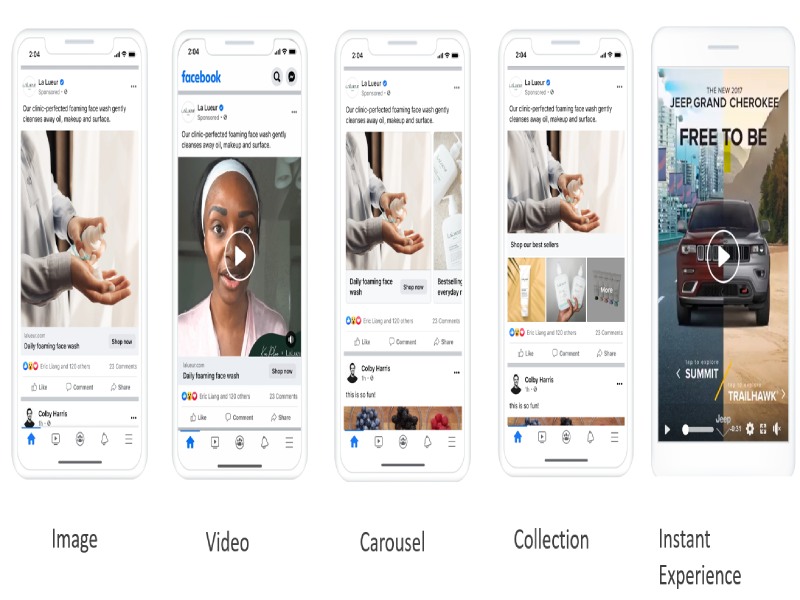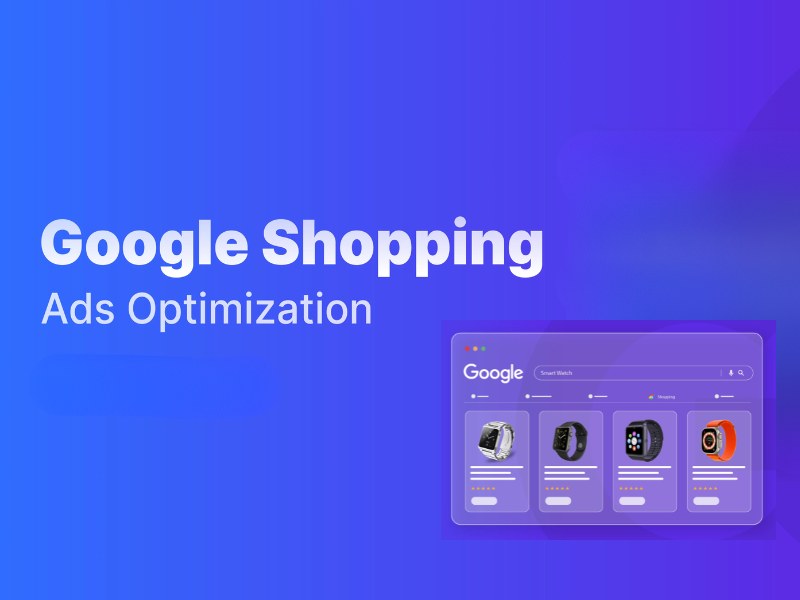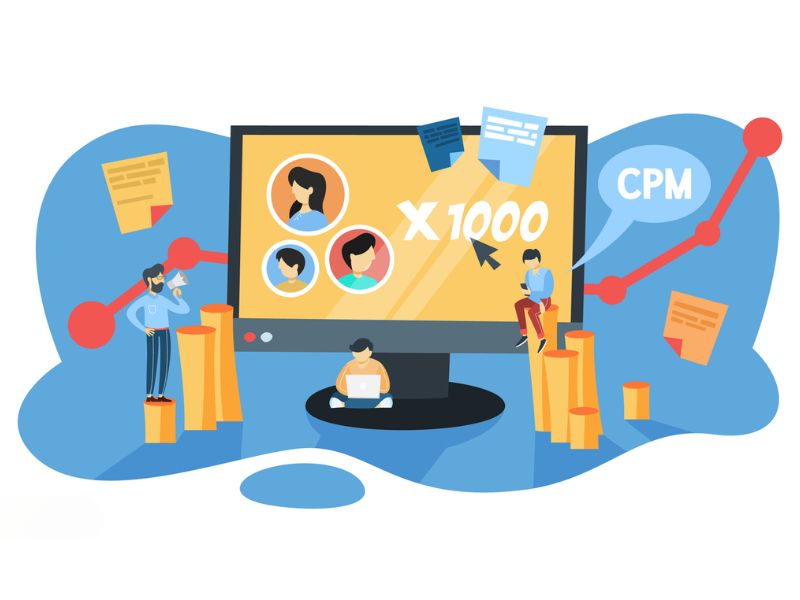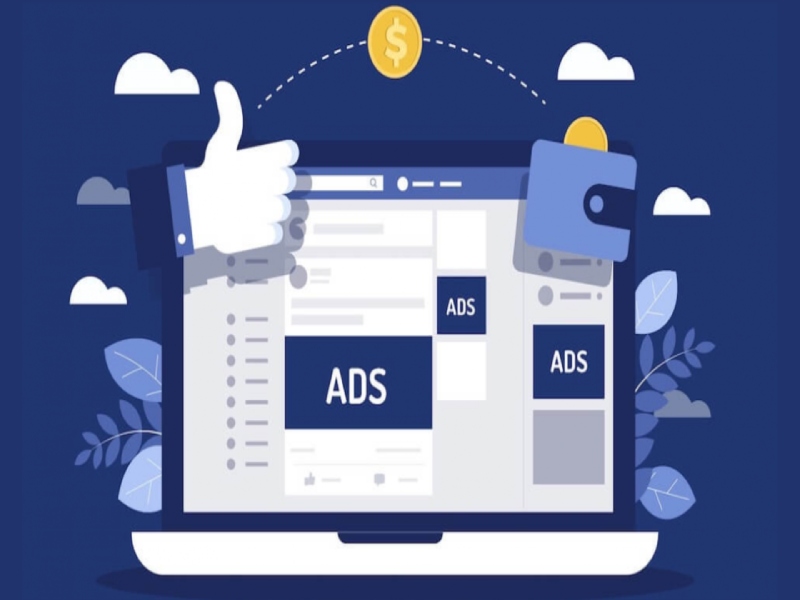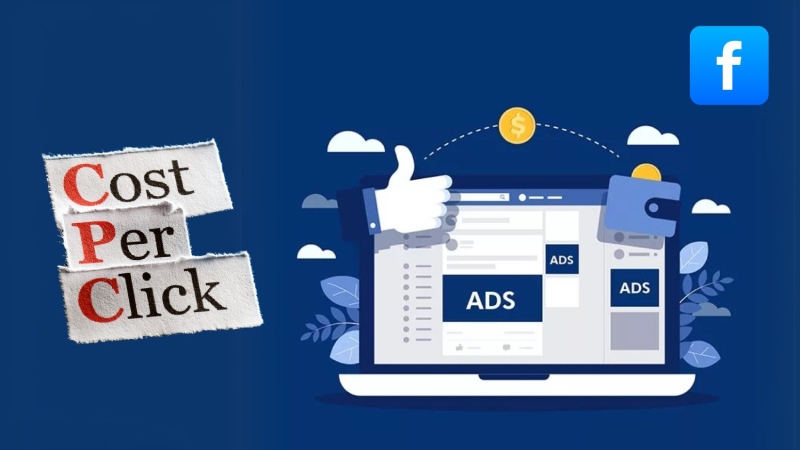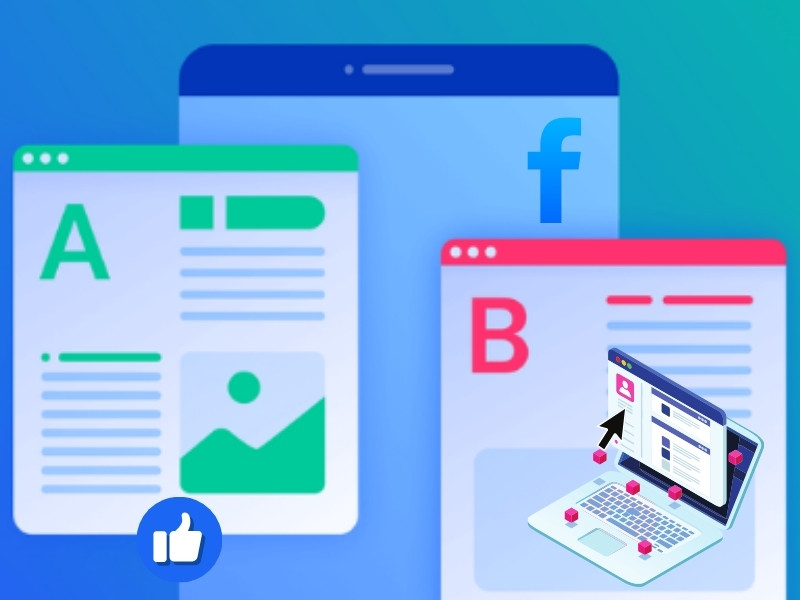In the fast-paced world of digital marketing, manually managing ads may fall short. Using AI tools for Facebook Ads can help businesses stay ahead, optimize campaigns, and compete more effectively. This article from Nemi Ads will guide you through choosing the best tools for maximum impact. Let’s dive in!
1. Can I use AI Tools for Facebook Ads?
If you’re unsure whether AI tools for Facebook Ads are right for your business, understanding how they work and their benefits is essential.
| What are AI Tools for Facebook Ads? AI tools for Facebook Ads are automation solutions designed to enhance campaign performance. They analyze data, adjust ads, target audiences, and recommend improvements. These tools draw on data from conversions, Pixel insights, and user interactions to drive maximum efficiency. |
So, can I use AI Tools for Facebook Ads? – Yes, and here’s why:
- Reach the right audience: AI tools analyze user behavior and historical data to pinpoint high-potential audiences, using features like “Lookalike Audience” and “Detailed Targeting.” This ensures your ad reaches the customers most likely to be interested.
- Boost ad goals achievement: AI personalizes ad copy and optimizes placements based on customer preferences and behaviors, driving user engagement and desired actions.
- Save time and budget: Automation saves businesses time and effort, while intelligent budget distribution avoids overspending, ensuring funds are used effectively.
- Optimize ROI: AI continuously assesses performance, predicts outcomes, and provides strategic recommendations. Following these insights enables informed decisions and maximizes returns. According to Meta Advantage, businesses using Advantage+ shopping campaigns saw a 32% increase in return on ad spend (ROAS), a 14% boost in purchases, and fivefold audience reach growth.
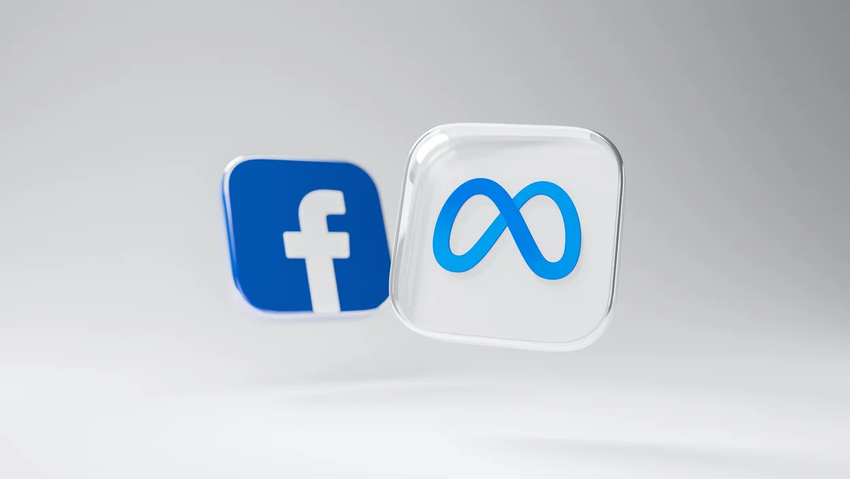
2. Key Considerations When Using AI for Facebook Ads
AI tools bring significant benefits, but they also come with risks. Therefore, it is crucial to balance automation with thoughtful oversight:
- Data security risks: AI tools require access to sensitive data, raising concerns about potential data breaches. Ensure compliance with data protection regulations and use robust security measures to mitigate risks.
- Reduced personal connection: Customers seek authentic interaction, not automated responses. When implementing AI tools, businesses often stumble by neglecting personalization, overlooking design, and ignoring social listening. To ensure content resonates, it is crucial to regularly incorporate survey feedback, social interactions, and response loops.
- Creativity constraints: AI, based on existing data, may lack originality. Complementing AI insights with human creativity ensures content that stands out and engages effectively.
- Loss of brand voice: While efficient, AI tools might not always capture your brand’s unique tone. Provide AI tools with brand guidelines to maintain consistency and alignment with your voice.
- Accuracy of data sources: Not all AI data sources are up-to-date or accurate, which can lead to unreliable targeting or wasted ad spend. Advertisers should prioritize data from trusted sources like Meta Pixel or APIs for reliability.

3. Top 10+ AI Tools for Facebook Ads
To assist businesses in selecting the most suitable AI tool for Facebook Ads, Nemi
A Ads provides a comprehensive comparison table outlining each tool’s advantages, disadvantages, and recommended uses.
| AI Tool | Who & When to use | Description |
| Meta Advantage | Ideal for campaigns focused on Facebook and Instagram | Deep integration within Meta’s ecosystem (Facebook, Instagram) |
| AdEspresso | Best for SMBs and new advertisers | User-friendly interface, easy to use for beginners.Flexible and ready-made A/B testing templates. |
| ADXL AI | For automated ad optimization | Integrates AI to automatically enhance ad performanceReduce costs while maximizing ROI. |
| Madgicx | Suitable for large businesses needing multi-channel optimization | Multi-channel optimization with advanced analysis Capabilities for in-depth performance insights. |
| Revealbot | For automating large-scale, continuous campaigns | Automates advertising processes comprehensivelyGenerates real-time reports based on specified metrics. |
| Canva | Use for creating visual content (images/videos) for Facebook ads | Rapid content creation.User-friendly interface.Useful for simple graphic and video design. |
| Trapica | For medium to large businesses requiring real-time data optimization | Leverages machine learning to optimize campaigns in real timeReduces ad spend and improves performance. |
| Zalster | Best suited for large businesses with high advertising budgets | Automates optimization processesEnables easy, data-driven campaign adjustments. |
| Adroll | Ideal for businesses focused on multi-platform retargeting and optimization (e.g., Facebook, Google) | Integrates across multiple platforms.Allows easy tracking and retargeting on various channels. |
| AdStage | For large businesses needing analytics and optimization across multiple platforms | Aggregates advertising data from multiple channels with robust analytics tools for enhanced campaign management. |
| Albert.ai | Suitable for large, long-term campaigns requiring adaptive optimization | Automates long-term campaign planning and optimizationLearn and adapt to market data for continuous improvement. |
3.1. Facebook Ads Manager (Meta Advantage)
Meta Advantage is Meta’s AI-driven solution tailored to optimize ad campaigns across Facebook and Instagram. With features like Advantage+ Shopping and Advantage+ App, it streamlines campaign management while saving time and effort.
As a Facebook default built-in tool, Facebook Ads Manager is helpful with great advantages:
- User-friendly: Simple interface that is accessible for beginners.
- Comprehensive optimization: Automates ad processes, from targeting to distribution, boosting sales and app installs.
- High effectiveness: Increases ROAS by up to 32% and reduces average conversion costs by 26% (according to Meta).
- Broad integration: Seamless access to Meta’s suite of business applications.
- Budget-friendly: Free to use, with costs applied only to active ad spend.
Meta Advantage is ideal for businesses needing fast, effective campaign optimization with minimal management, particularly for campaigns focused on online sales, app installs, or reaching new customers across Meta platforms (Facebook, Instagram).
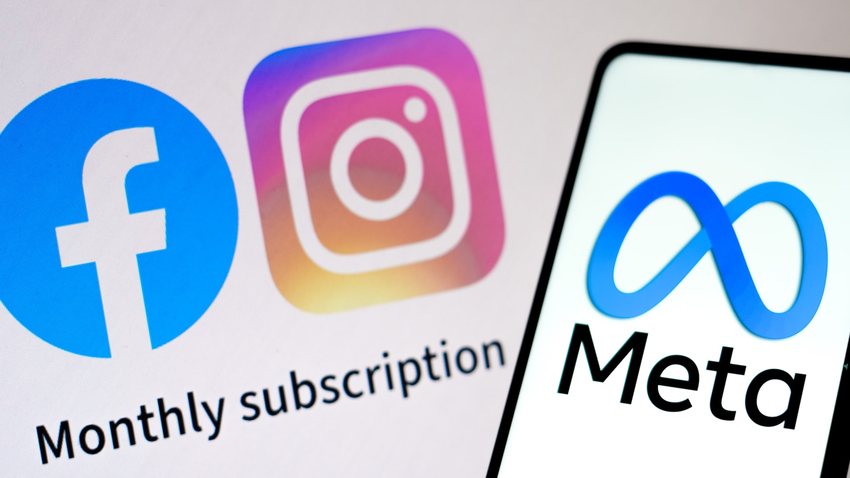
3.2. AdEspresso
AdEspresso is a comprehensive ad optimization tool for Facebook and Instagram. Designed to help users of all experience levels, it simplifies the process of managing, creating, and testing ads.
| Pros | Cons |
| >> User-friendly Interface: Espresso’s intuitive layout makes it easy for beginners to navigate. It streamlines campaign setup and management, making it less daunting for first-time advertisers. >> Robust A/B Testing: Supports testing of multiple ad versions (copy, images, audience) simultaneously, pinpointing the best-performing ads for maximum impact. >> Comprehensive campaign management: A dashboard for managing multiple ad accounts makes it simple to switch between campaigns. >> Automated reports: Customizable PDF reports offer key metrics (CTR, CPC, CPA, conversions), making it easy to track and share campaign results. | >> Limited updates: AdEspresso hasn’t introduced significant new features recently, so its functionality might lag behind other tools with more frequent updates. |
AdEspresso is ideal for small to medium-sized businesses looking for an all-in-one tool to streamline ad management, especially if the business does not have a dedicated ad management team.
AdEspresso generated 111,503 accounts, automatically promoted 519,130 posts, and created over 10 million ads in the past year alone.
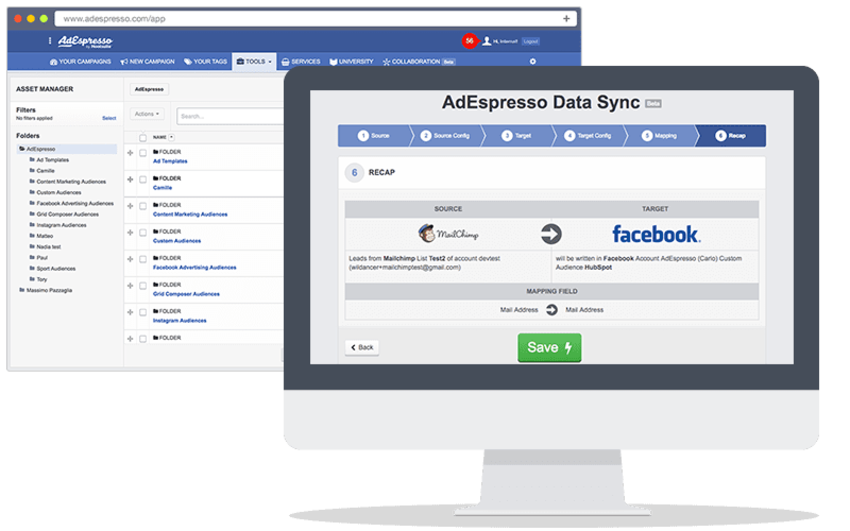
3.3. ADXL AI
ADXL AI is an AI-powered tool that enhances and automates Facebook ad performance, providing fast, widespread, and optimized ad coverage with minimal effort.
| Pros | Cons |
| >> Advanced targeting: Uses AI for niche audience targeting, efficiently reaching specific user segments with detailed results at the click of a button. >> Enhanced retargeting: Offers retargeting options for both identified and anonymous users, such as website visitors or cart abandoners, increasing personalization and engagement. >> >> Efficient Web tracking: Integrates tools like Pixel and gtag.js with simple code, tracking conversions and user behaviors without extensive technical work. ADXL AI has achieved over 2 billion user activities, 5 million conversions, and collected 200+ data points, resulting in an 80% reduction in workload for businesses, eliminating the need to manage multiple ad accounts, optimizing budgets by 30% and many more. | >> Premium pricing: ADXL AI’s advanced targeting and automation features come at a higher cost, which may be challenging for smaller businesses. |
ADXL AI suits businesses focused on advanced targeting and ROI maximization, particularly in larger campaigns.
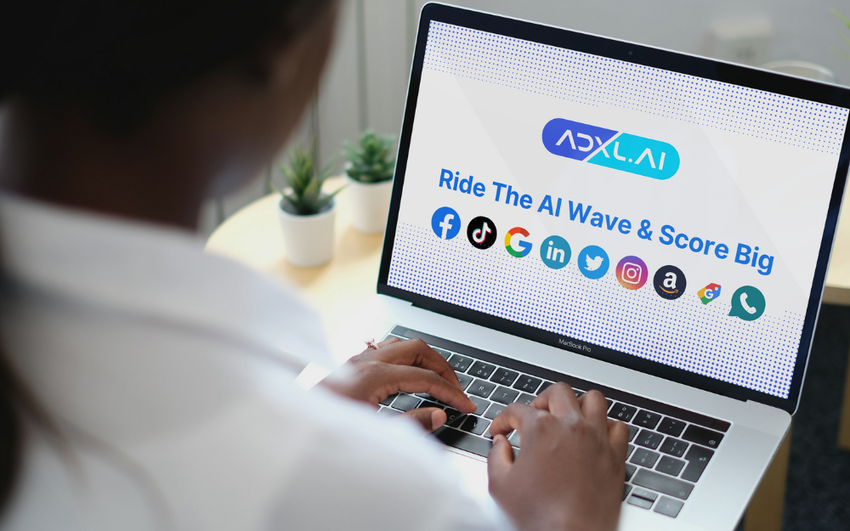
3.4. MadgicX
MadgicX is an AI-driven ad optimization platform that integrates automation, data analytics, creative management, and performance visualization to maximize ROI.
| Pros | Cons |
| >> Automation for efficiency: Utilizes machine learning to adjust budgets in real time, ensuring cost-effective ad spend and high returns. >> Creative management: Offers tools to analyze creative performance, helping identify top-performing visuals and copy for specific audiences. >> ROI optimization: The tool has a strong focus on ROI optimization, helping businesses achieve the highest profits while saving management time. | >> Cost: Starting at $55/month, MadgicX may be expensive for small businesses with limited ad budgets. |
Notable campaigns applying this tool include Wizerlink (12.44x sales growth, 37% lower acquisition cost) and Taylor Made (+28% acquisition ROAS, -34% cost per add-to-cart).
Ideal for larger businesses with significant ad budgets, MadgicX offers powerful automation and ROI optimization, reducing time spent on manual ad management.
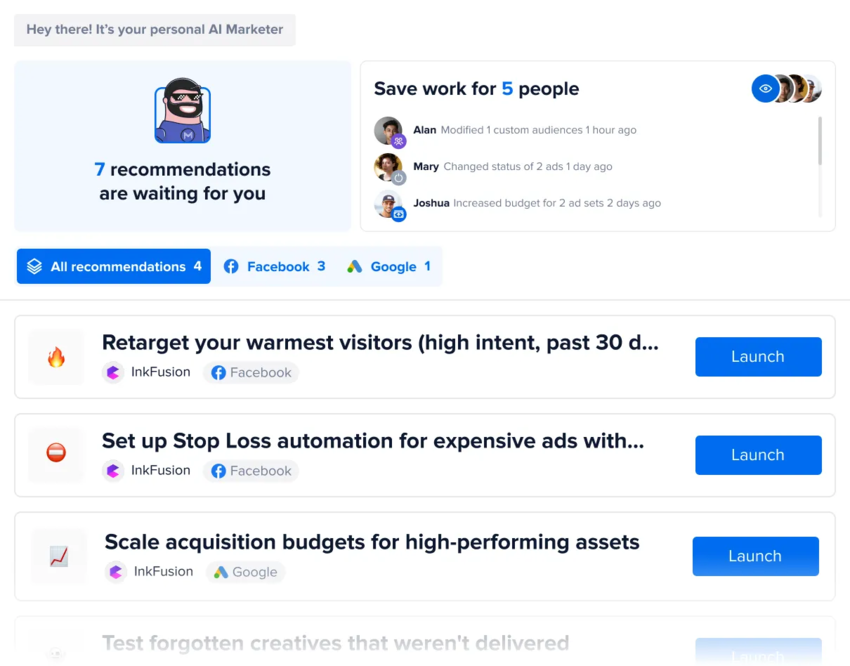
3.5. Revealbot
Revealbot is an automation tool that simplifies ad management by making real-time adjustments based on performance data, covering budgets, ad copy, and targeting.
| Pros | Cons |
| >> Complete automation: Automates bid adjustments, budget, and creative changes based on performance metrics, saving time on daily management. >> High flexibility: Allows users to set custom automation rules for specific campaign goals, from raising bids to pausing low-performing ads. >> Facebook Ads Manager integration: Seamlessly integrates with Facebook Ads Manager for smooth tracking and updates, enabling easy synchronization of campaigns. | >> Higher pricing: Starts at $99/month, which can be high for smaller advertisers. >> Technical knowledge: To make the most of its features, users should be familiar with ads and automation. |
This tool has been extensively used in real-world campaigns, driving impressive results such as a 76% reduction in spend on non-converting ads, a 1,160% increase in total client ad spend, and a 30% decrease in time spent on manual optimization and testing.
Revealbot is ideal for businesses running high-volume, complex campaigns that require frequent adjustments. It is a valuable tool for companies looking to save time on campaign management while keeping performance optimized.
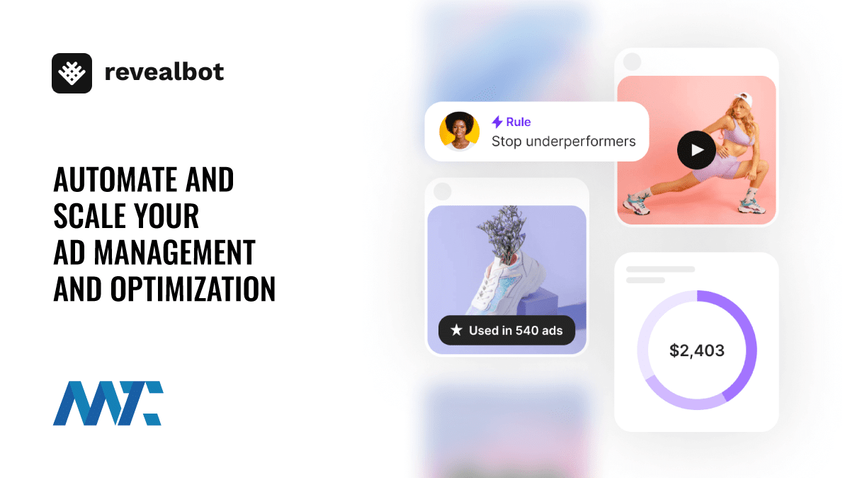
3.6. Canva
Canva is a user-friendly design tool that helps non-designers create high-quality visuals for ads on Facebook and other platforms with ease and relatively cheap advertising options.
| Pros | Cons |
| >> Ease of use: With its drag-and-drop interface and premade templates, Canva is accessible even for beginners with no design experience. >> Extensive resource library: Thousands of templates, stock photos, and icons are available, providing various options for creating engaging visuals for ad. >> Direct social media integration: Allows for direct posting to Facebook and other platforms, facilitating quicker ad content publishing. | >> Limited advanced ad features: Canva lacks advanced ad features, such as targeting and analytics, which limits its use beyond design. |
Trusted and chosen by industry leaders like Sony Music, Skyscanner, HubSpot, DANONE, and Salesforce, Canva is a popular choice among businesses.
Canva is ideal for small businesses or marketers who need quick, professional-looking ad visuals without the need for design experience, perfect for simple Facebook ad campaigns.
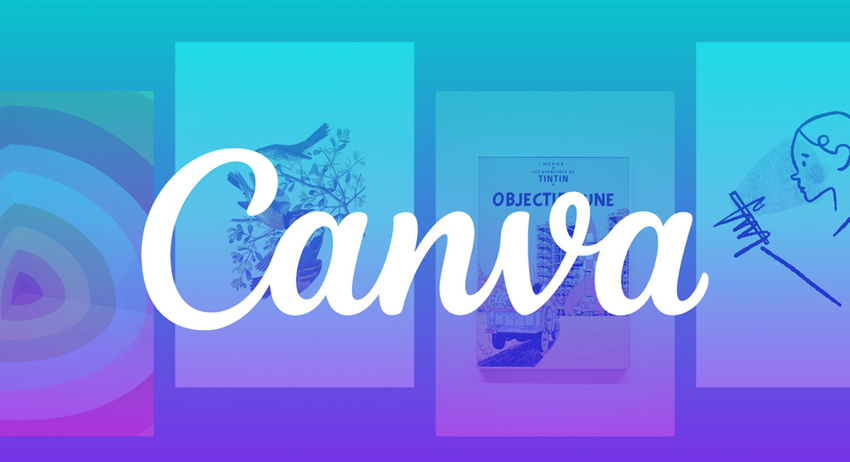
3.7. Trapica
Trapica is a comprehensive AI-powered platform for managing ad campaigns across social media channels, search engines, and demand-side platforms (DSPs). This tool’s main advantage lies in its fully automated approach without requiring manual setup.
| Pros | Cons |
| >> Full automation: Covers every aspect of ad management, from real-time targeting, biding to budget adjustments based on campaign performance. >> Audience optimization: Analyzes and updates audience insights in real-time, guaranteeing ads are shown to the right people. >> Real-Time Bidding: Uses real-time data, KPIs, and budget insights to secure optimal bids. >> Creative Scoring and A/B Testing: Assesses ad effectiveness and toggles ads on/off based on performance throughout the campaign. | >> High cost: Advanced features require a substantial investment. >> Technical knowledge: Users should have ad and campaign analysis skills to fully utilize Trapica’s potential. |
Businesses using Trapica have achieved impressive results, including a 26% reduction in acquisition costs, a 64% decrease in campaign management time, and a 41% increase in ROAS.
Ideal for large enterprises or agencies managing complex, multi-platform campaigns with high automation needs to boost ROAS and reduce CPA.
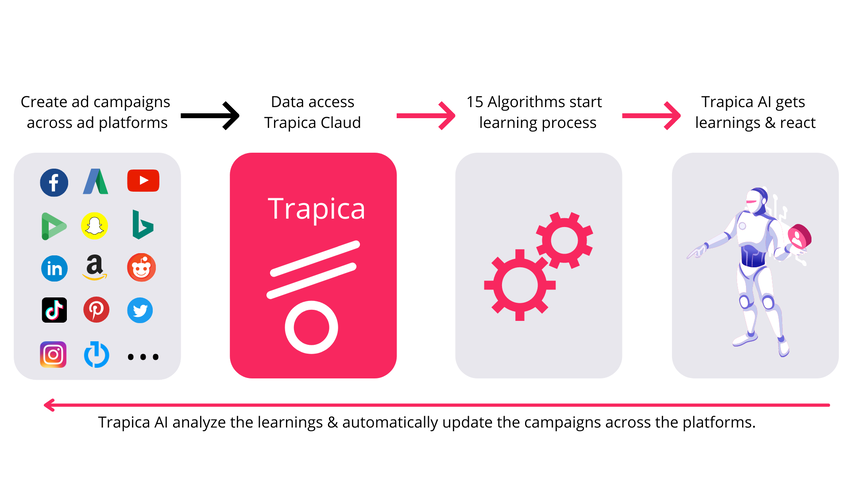
3.8. Zalster
Zalster is an ad optimization tool for businesses looking to combine data-driven strategies with creative tactics to enhance campaign performance and drive growth. This tool excels at simplifying reporting (via graphics and integration with Slack) and providing real-time insights for effective decision-making.
| Pros | Cons |
| >> Social media advertising: Customizes campaigns across platforms like Facebook, Instagram, TikTok, and Pinterest to reach targeted audiences. >> Technical integrations: Supports integrations like Conversions API (CAPI), GA4, and in-depth reporting, reducing the need for IT support. >> Professional support: Offers ongoing support and consultancy, fostering strong client relationships. >> A/B testing: Allows for manual bid testing and conversion event testing to identify cost-effective ad variants. | >> Platform limitations: Primarily supports Meta and TikTok, making it less suitable for cross-channel needs. >> Service cost: High service fees due to customizable support may be a concern for some businesses. |
Zalster has been used and positively reviewed by industry professionals such as the Online Marketing Manager at Homeroom, the CEO at Anthony Edward, the Digital Marketing Manager at Dreams, and many other business owners.
Zalster is recommended for businesses focused on social media ad optimization with technical needs, aiming to minimize tech resource investments.
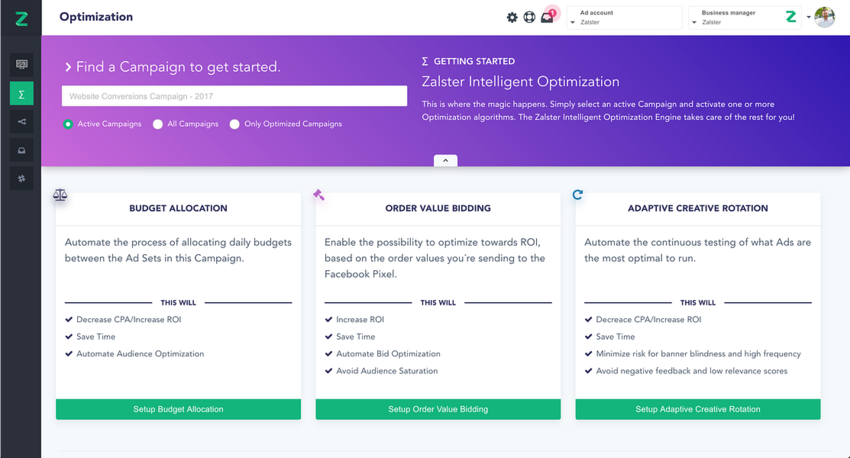
3.9. AdRoll
AdRoll is a multi-channel ad management platform that simplifies the creation, editing, optimization, and tracking of ads across different platforms from one centralized dashboard.
| Pros | Cons |
| >> Cross-channel ad management: Runs and manages campaigns across Facebook, Instagram, TikTok, Pinterest, and web advertising. >> Easy integration: Connects to Facebook Ads Manager in just a few clicks, allowing automatic imports of campaign and audience data. >> Detailed analytics: A multi-channel reporting dashboard enables easy monitoring of ad performance, costs, CTR, and other metrics. >> Creative Optimization: Allows users to upload and store creative assets in AdRoll’s library, making them readily available for cross-platform campaigns. | >> Reliance on Integration: Campaign effectiveness can be limited if integrations don’t work seamlessly, making it complicated for small businesses. |
With over 15 years of experience, AdRoll has successfully partnered with more than 140,000 companies, achieving impressive results like a 132% increase in returning customers for Health Nutrition, a 30% boost in new account conversions for TMGM, and a 12,280% ROI for one client.
AdRoll is ideal for businesses looking to focus on managing multi-channel ad campaigns, analyze and optimize ads across multiple platforms, and save time.
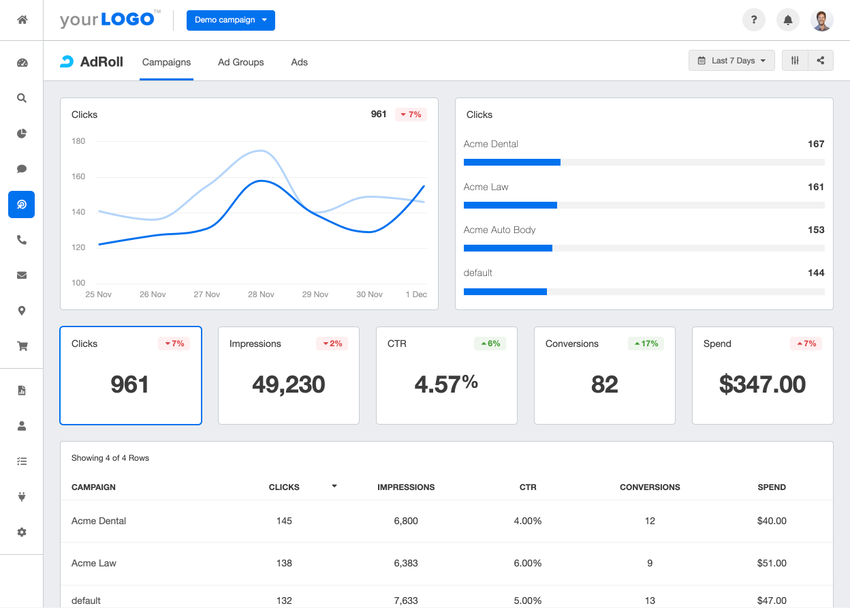
3.10. AdStage
AdStage is a specialized reporting and automation tool for Facebook ads, providing a comprehensive overview and optimized multi-channel ad reporting.
| Pros | Cons |
| >> Comprehensive reporting: Integrates data from over 17 sources, simplifying ad data consolidation on a single platform. >> Automated optimization: Adjusts campaigns based on CTR, CPA, and other metrics. >> Data API Integration: Supports businesses with robust tech infrastructure needing data integration across CRM, payment systems, and third-party services, creating unified reports. | >> Limited Ad Creation Capability: Not ideal for those looking to manage complete campaigns from one tool. >> Integration-Dependent: Campaign performance can be affected by the quality of integrations. >> High Cost: The Data API product package starts at $699/month. |
AdStage is designed for large enterprises and companies that need to analyze ad data from multiple sources, optimizing campaigns based on KPIs without extensive manual intervention.
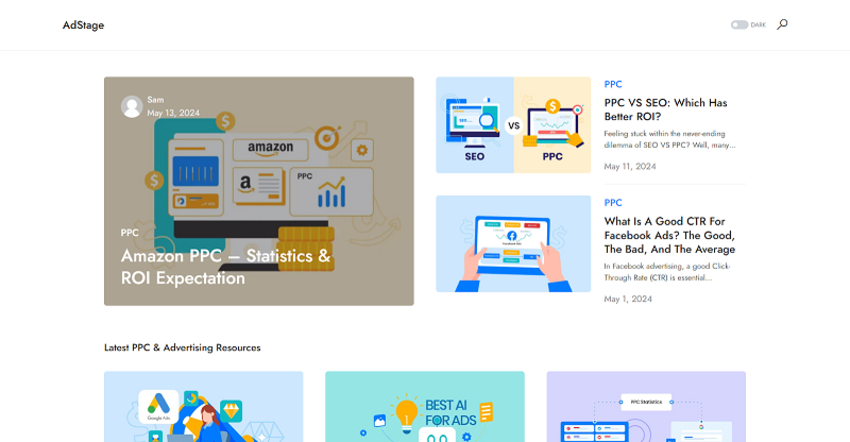
3.11. Albert.ai
Albert.ai is an AI-powered platform for automating paid search, social media, and display advertising, handling everything from campaign creation to optimization.
| Pros | Cons |
| >> 24/7 optimization: Continuously monitors and adjusts campaigns, improving performance without frequent human intervention. >> Multi-channel strategy: Seamlessly integrates and executes campaigns across different channels, maximizing results. >> Mass personalization: Analyzes small customer segments and customizes creative content to ensure relevance and increase engagement. >> Quick setup: Enables fast campaign deployment and optimization within a few weeks, delivering quick results. | >> Limited human control: Advertisers may have restricted control over certain campaign elements. |
Albert.ai has helped improve YouTube ROI by 16.3% for a leading CPG advertiser and generated an 800% ad spend return with automated creative optimization.
Albert.ai is ideal for businesses aiming to expand and personalize ad campaigns with minimal manual management, achieving continuous optimization and precise targeting.
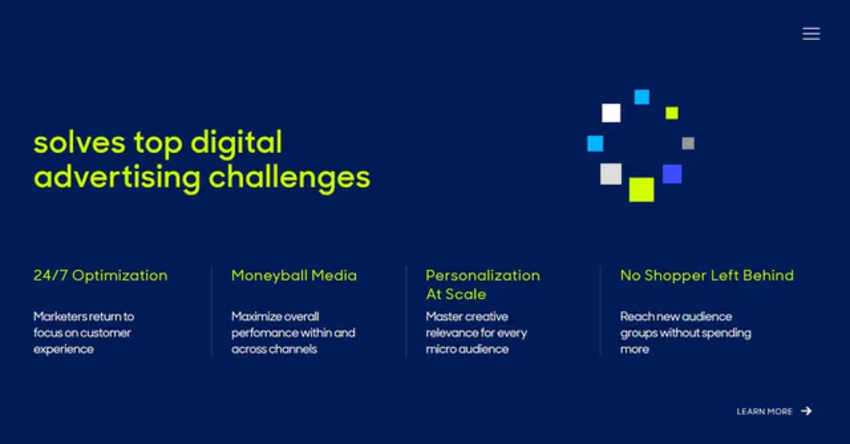
4. Case Study: How AI Tools Improved a Facebook Ad Campaign
Applying AI tools to Facebook Ads campaigns can lead to highly effective outcomes. The following case studies demonstrate how businesses have used AI tools to optimize campaigns and drive revenue growth.
4.1. Case study: fresh’s Success with Meta Advantage Tools
- Objective: Increase revenue during the Cyber Week holiday shopping season.
- Implemented solutions:
- Advantage+ shopping campaigns: Used to optimize ads and automate budget allocation based on each ad’s real-time performance.
- Shops ads: Targeted ads directed to fresh’s online store or website, focusing on customers with the highest purchase intent.
- AI text variants: Automatically generated variations of ad text, making messages more relevant to different customer segments.
- Campaign effectiveness: During Cyber Week (November 11 – December 2, 2023), the results were impressive:
- 5.1x Return on Ad Spend (ROAS) by using Advantage+ Shopping Campaigns, Shops Ads, and AI text variants.
- 42% Increase in Purchases due to AI-powered optimization in Meta’s tools.

4.2. Case Study: GlobeIn’s Success with AdEspresso AI Tools
- Objective: Increase revenue, reach new customers, and recover lost sales along the marketing funnel.
- Implemented solutions:
- Remarketing: Targeted users who had previously engaged with ads, page posts, or visited the website but had not completed a purchase.
- Audience Split Testing: Experimented with different audience segments, including lookalike audiences and various interest combinations.
- Campaign effectiveness:
- 200% Annual Growth since the launch in 2017.
- 5x Increase in Sign-Ups compared to previous periods.

5. FAQs about AI Tools for Facebook Ads
1. Does Meta use AI for ads?
Yes, Meta leverages advanced algorithms and AI-driven content in its ad systems to improve targeting and personalization, optimizing performance for advertisers.
2. Does Facebook detect AI-generated content?
AI-generated content on Facebook can boost ad engagement, reach, and click-through rates, depending on its quality and relevance to the audience. Facebook’s labeling of AI-generated content enhances transparency, potentially influencing user trust and interaction.
3. What is the role of AI Tools in Facebook Ads?
AI tools play a crucial role in enhancing productivity and effectiveness in Facebook ad campaigns. They can automate targeting, optimize ad delivery, generate creative content, and provide real-time analytics, ultimately improving campaign outcomes.
We hope this article has provided insight into groundbreaking AI tools for Facebook ads. By understanding these tools and choosing the right one, you can transform your business’s advertising strategy, stay ahead of competitors, optimize budgets, and boost conversions. Follow Nemi Ads for regular updates on valuable advertising tools!
